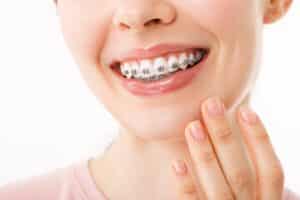
What Are InBrace Lingual Braces?
The orthodontist places InBrace lingual braces on the backside (lingual side) of your teeth, making them nearly invisible when you smile.
InBrace braces straighten your teeth more discreetly by attaching to the back of the teeth, unlike traditional braces that attach to the front.
Benefits of InBrace Lingual Braces
InBrace lingual braces hide behind your teeth, so most people won’t even know you’re wearing them. The orthodontist designs InBrace braces specifically for your teeth, ensuring a comfortable and effective treatment. Since the brackets sit behind your teeth, you don’t have to worry about visible staining.
Potential Drawbacks
It may take some time to get used to the feeling of braces on the back of your teeth. You’ll need to be more careful when cleaning since the brackets are harder to reach.
Traditional Braces
Traditional braces are the most common kind. Metal brackets attach to the front of your teeth and connect with wires and rubber bands.
Advantages of Traditional Braces
Traditional braces can correct a wide range of dental issues, from simple to complex. You can choose different colors for the rubber bands, making the process more fun, especially for younger patients. Traditional braces are strong and can withstand most types of orthodontic treatment.
Potential Drawbacks
Traditional braces are quite noticeable, which may be a concern if you’re looking for a more discreet option. The metal brackets can sometimes irritate the inside of your mouth.
Which Option Is Right for You?
Choosing between InBrace lingual braces and traditional braces mainly depends on your lifestyle, treatment needs, and personal preferences. If you want a less noticeable treatment option, InBrace may be the way to go.
On the other hand, if you’re looking for a reliable and time-tested option, traditional braces are a great choice.
Schedule a Braces Consultation in Denver, CO
Choosing the right type of braces is important, and you should get advice from an experienced orthodontist. Thankfully Dr. Robert Rudman and his entire team at Advanced Orthodontic Care are here to help you. Contact us at 303-331-0222 to schedule a consultation today.


